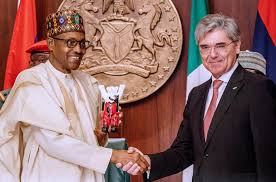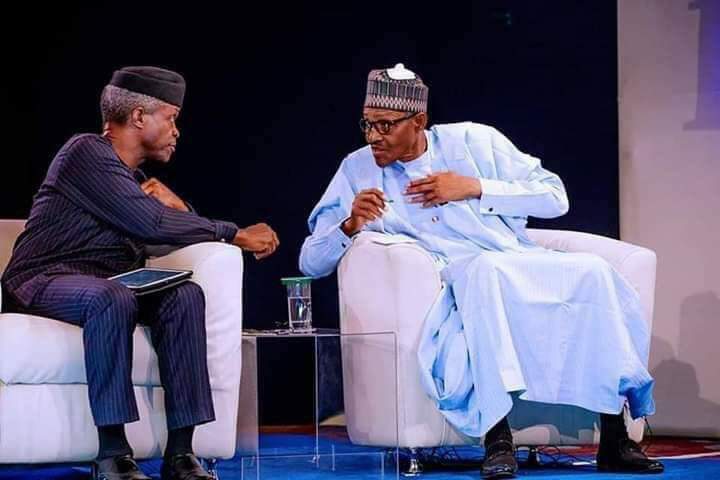More revelations have emerged from the latest power sector revival deal sealed between the presidency and the German power giant, Siemens on Monday.
Whereas throughout the discussions, no mention of funding was made by either parties on how to source fund for 7,000mw and 11,000MW of reliable power supply by 2021 and 2023 in the first and second phases of the deal, respectively, analysts believed that financing of the deal may be by Siemens as the amount that would be used for such job was not captured in the 2019 budget after all.
Business Hilights recalls that the deal stemmed from the August 31, 2018 meeting between the Nigerian President and the German Chancellor, Angela Merkel, in Abuja.
However, granted that Siemens will fund the project between now and 2023, it means that the efforts of the returning Minister of Finance, Mrs Zainab Ahmed (her name is included in the released ministerial list) in driving $1bn power loan request at the recent World Bank/IMF meeting in New York may have been bungled.
Before now, power analysts had expressed reservations on the chances of securing the said loan considering the current state of Nigeria’s power sector where two of the major links, the generation and distribution are already in the hands of the private sector, who may not wish to dip their hands in any loan they are not privy to.
Besides, observers say even though the new German deal will be advantageous to both Nigeria and Nigerians, the questions that are in need of urgent answers include what becomes the fate of the hanging Mambila Power scheme? What is the stake of Gencos and Discos and their roles in this new power roadmap?
With this new partnership, can Discos still be motivated to invest heavily to upgrade their infrastructure or will Siemens do so for them?
These questions have become pertinent considering the way and manner President Muhammadu Buhari addressed his audience on Monday during the signing of the understanding with Siemens’s Global Chief Executive Officer, Mr Joe Kaeser.
Otherwise, he asked Siemens, the Transmission Company of Nigeria (TCN) and the regulator, Nigerian Electricity Regulatory Commission (NERC) to work hard to achieve 7,000mw and 11,000MW of reliable power supply by 2021 and 2023 in the first and second phases of the deal, respectively. This means by 2025 when the contract will lapse, a total of 25,000MW is expected to have been met.
In his address, Buhari recalled that “We all know how critical electricity is to the development of any community or indeed any nation. “And in Nigeria, while we are blessed to have significant natural gas, hydro and solar resources for power generation, we are still on the journey to achieving reliable, affordable and quality electricity supply necessary for economic growth, industrialisation and poverty alleviation.
“There have been many attempts at solving the electricity problem in our country. Previous governments have explored state-funded solutions through the ill-prepared National Independent Power Projects. They also explored the installation of large emergency power projects. There was also the partial privatisation of the power generation and distribution sectors.
“These various interventions to solving the electricity problem have yielded an imbalance between the amount of power generated and the amount available for consumers. Despite over 13,000MW of power generation capacity, only an average of 4,000MW reliably reaches consumers. Now, we have an excellent opportunity to address this challenge.”
Buhari noted that because his government is aware that both the transmission and distribution systems had remained major constraints, “This is why I directed my team to ask Siemens and our Nigerian stakeholders to first focus on fixing the transmission and distribution infrastructure, especially around economic centres where jobs are created.
“While it was evident that more (work) needed to be done to upgrade the sub-transmission and distribution system, our government was initially reluctant to intervene as the distribution sector is already privatised.
“I am therefore very pleased with the positive feedback from private sector owners of the distribution companies, who have all endorsed government’s intervention to engage Siemens on this end-to-end plan to modernise the electricity grid.”
According to him, “Our goal is simply to deliver electricity to Nigerian businesses and homes. My challenge to Siemens, our partner investors in the distribution companies, the TCN and the electricity regulator is to work hard to achieve 7,000MW of reliable power supply by 2021 and 11,000mw by 2023 – in phases one and two, respectively.
“After these transmission and distribution system bottlenecks have been fixed, we will seek in the third and final phase to drive generation capacity and overall grid capacity to 25,000MW.”
Responding, the Siemens boss, Kaeser recalled that a Letter of Agreement on the Nigerian Electrification Road map was submitted to the Nigerian President in November, 2018 and assured that the agreement will be delivered on record time.
Kaeser, who maintained silence on funding, was quick to aver that “That will significantly enhance the country’s power supply and gets the country to the next industrial phase. We believe we will all very much benefit together, the people of Nigeria and of course Siemens as a company.”
In his parting shot, Siemens boss assured that “I will personally make sure that this will be a big success for Nigeria, Siemens and our partners in the country.”









